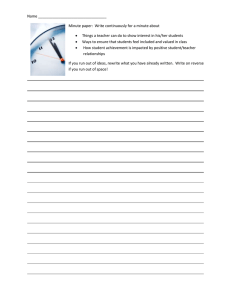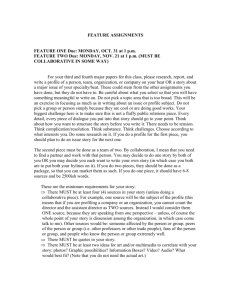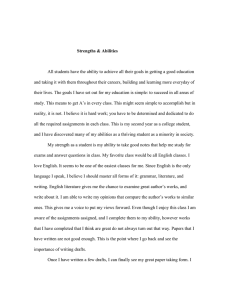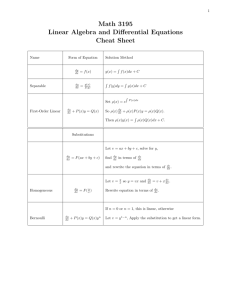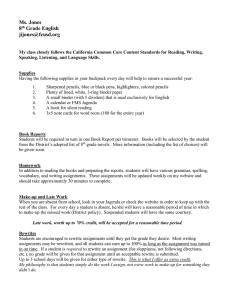Santiago Canyon College: Arts, Humanities and Social Sciences Course Syllabus
advertisement
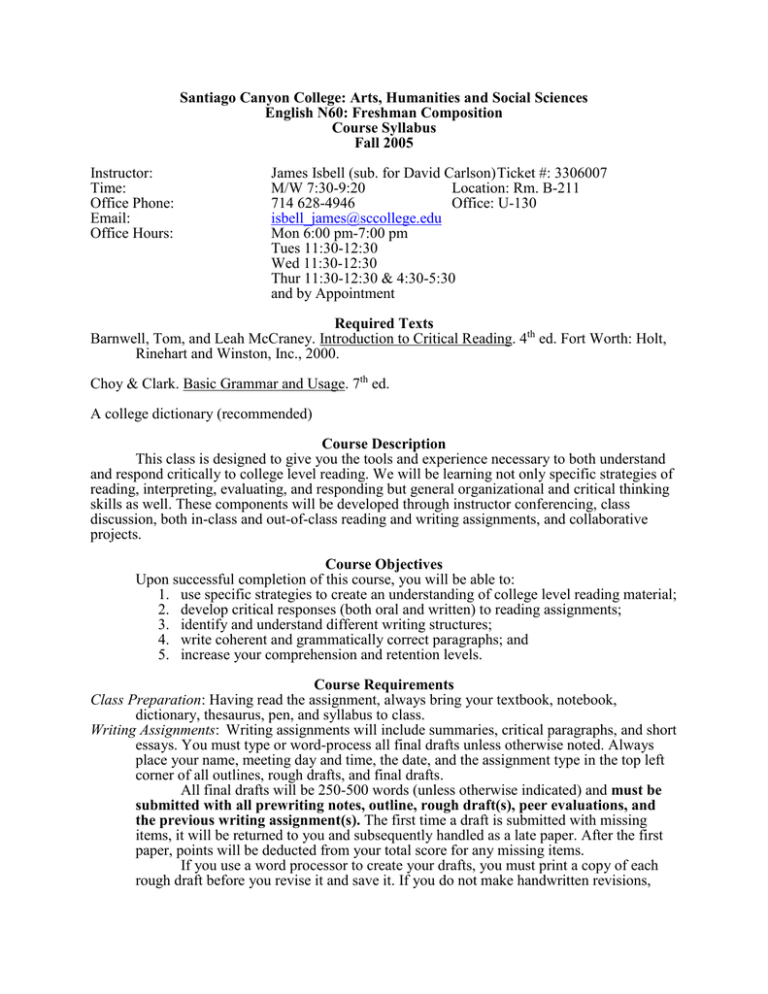
Santiago Canyon College: Arts, Humanities and Social Sciences English N60: Freshman Composition Course Syllabus Fall 2005 Instructor: Time: Office Phone: Email: Office Hours: James Isbell (sub. for David Carlson) Ticket #: 3306007 M/W 7:30-9:20 Location: Rm. B-211 714 628-4946 Office: U-130 isbell_james@sccollege.edu Mon 6:00 pm-7:00 pm Tues 11:30-12:30 Wed 11:30-12:30 Thur 11:30-12:30 & 4:30-5:30 and by Appointment Required Texts Barnwell, Tom, and Leah McCraney. Introduction to Critical Reading. 4th ed. Fort Worth: Holt, Rinehart and Winston, Inc., 2000. Choy & Clark. Basic Grammar and Usage. 7th ed. A college dictionary (recommended) Course Description This class is designed to give you the tools and experience necessary to both understand and respond critically to college level reading. We will be learning not only specific strategies of reading, interpreting, evaluating, and responding but general organizational and critical thinking skills as well. These components will be developed through instructor conferencing, class discussion, both in-class and out-of-class reading and writing assignments, and collaborative projects. Course Objectives Upon successful completion of this course, you will be able to: 1. use specific strategies to create an understanding of college level reading material; 2. develop critical responses (both oral and written) to reading assignments; 3. identify and understand different writing structures; 4. write coherent and grammatically correct paragraphs; and 5. increase your comprehension and retention levels. Course Requirements Class Preparation: Having read the assignment, always bring your textbook, notebook, dictionary, thesaurus, pen, and syllabus to class. Writing Assignments: Writing assignments will include summaries, critical paragraphs, and short essays. You must type or word-process all final drafts unless otherwise noted. Always place your name, meeting day and time, the date, and the assignment type in the top left corner of all outlines, rough drafts, and final drafts. All final drafts will be 250-500 words (unless otherwise indicated) and must be submitted with all prewriting notes, outline, rough draft(s), peer evaluations, and the previous writing assignment(s). The first time a draft is submitted with missing items, it will be returned to you and subsequently handled as a late paper. After the first paper, points will be deducted from your total score for any missing items. If you use a word processor to create your drafts, you must print a copy of each rough draft before you revise it and save it. If you do not make handwritten revisions, please highlight the revisions on each word-processed draft so that I can identify the steps in your writing process. All essays are due at the beginning of class on the date indicated. If you fail to submit any draft on the day it is due, you will have one (1) point deducted from the final score of that paper for each day it is late. It is your responsibility to make copies of all final drafts before submission. Keep all completed writing assignments and associated materials together in a portfolio so that they may be turned in when requested. Rewrites: If you receive a score lower than a "7" on any writing assignment, you will be allowed to rewrite the assignment until it is acceptable. The highest grade you can receive on this type of a rewrite is a "7." This does not apply to the final or research paper. You will be allowed to complete one (1) formal rewrite of any assignment at the end of the semester for a revised grade. This rewrite must be turned in by the day of the final exam and can receive a grade as high as a "10." This formal rewrite will not include the research paper or the final exam. Write "Rewrite" at the top of the first page of the final draft of all rewrites. If the rewrite is the final Formal Rewrite, write "Formal Rewrite" at the top of the first page of that final draft. Late Papers: Due to the compressed nature of summer classes, NO LATE PAPERS WILL BE ACCEPTED. Late papers are more detrimental to one's schoolwork than one expects. Research Paper: You will be responsible for completing a library research paper before the end of the semester. This paper will be a minimum of 500 words with three (3) outside sources in the text and may be done collaboratively with another student. You must complete this project in order to pass this class. Extra Credit: None. Attendance: This course is designed to allow the maximum amount of class time possible for writing and revision. Time not dedicated to this process will be used to explain assignments, answer questions, and promote group discussion focusing on current assignments. This interaction is an essential component of the writing process and makes regular attendance essential. Each of you will begin with ten (10) attendance points. Each time you are absent, one point will be deducted. A tardy or leaving early is equivalent to 1/2 point. Therefore, if you miss two classes and are late two classes, you will have three (3) points deducted from your final score, which means your final score will drop by 3%. (For example, if the final score for your coursework is 72%—a "C"—your score will drop to a 69%—a "D.") In addition, it is your responsibility to drop this class. After the first day of class, I will not drop you from the class for any reason. If you are not attending this class and have not dropped it by the final drop date, you will receive a grade commensurate with your work. Grading: Your final grade will be based on the following: Essay Responses Research Paper Final (Critical Essay) Participation (Attendance and Discussion) Homework 60% 15% 10% 10% 5% Grading Criteria: English 67 is a writing class and the bulk of your grade will be determined by your writing ability. You will be learning the basics of academic writing including the structure of academic paragraphs and essays as well as advanced forms of punctuation. I assume that when you start this class, you have the ability to write clear, complete English sentences using basic punctuation, sentence structure, and verb forms. With that in mind, you will be learning and be graded on your ability to master the following: Content: Structure: Mechanics: Discuss interesting, new ideas or more accepted ideas from a fresh perspective Clear thesis statement (when applicable) that contains a topic (the subject you are writing about) and the point (why you are writing about it) Clear topic sentence that contains a topic and point Clear, separate points that are directly related to the topic sentence Specific support for each point Clear conclusionary sentence that summarizes entire paragraph Clear thesis sentence (when applicable) at beginning of essay Clear topic sentence at beginning of paragraph Clear, separate points introduced with appropriate transitions Specific support for each point introduced with appropriate transitions Clear conclusionary sentence located at end of paragraph Complete sentences no fragments or run-ons correct use of end punctuation: periods, semi-colons, question marks, and exclamation points Clearly worded sentences clear word order clear word choice Correct verb forms 's' on end of third person singular verbs past, future, and perfect forms singular verbs for singular subjects and plural verbs for plural subjects same tense throughout paragraph (consistent tense) Correct use of pronouns singular pronouns for singular nouns and plural pronouns for plural nouns (pronoun/antecedent agreement) Correct use of articles use "the" only if you have already introduced the noun or the reader knows exactly which one you mean Correct use of capitals at beginning of sentences for all proper names, brand names, and titles Correct use of quotation marks around actual words someone speaks or writes around titles of smaller works (articles, essays, chapters, songs) Correct use of commas as the guidelines learned in class. Instructor Feedback: The written and verbal contents I make regarding your papers are designed to strengthen your personal reading and writing processes and, thus, make those processes more effective; I hold you responsible for adjusting your writing to those comments. If any comment is unclear, see me for an explanation. If I do not hear from you, I will assume that you have read my comments, understand them, and will modify your next assignment accordingly. Tutoring: Tutoring is available free of charge for most subjects at SCC. Tutoring is located in the U-116. I strongly encourage you to see a tutor whether it is for assistance with pre-writing, revising drafts, or checking the final draft itself. If you see a tutor on a regular basis (for each paper) and your writing improves, I will add up to 30 points to your final score. Make sure you ask for a yellow Tutorial Services Class Credit Card from your tutor to verify your tutoring time to me. Plagiarism is a serious offense: a plagiarized paper automatically fails and could earn an "F" for the course. Refer to the 2005-2006 Catalog for Santiago Canyon College’s official policy on plagiarism. Final Note: Although the actual work in this course is not necessarily difficult, the thought of writing (in any form) can be periodically frightening. I am here to help you learn how to communicate verbally—to realize power—and the exchange of ideas is a crucial component of the learning process. I invite discussion and the sharing of your thoughts and opinions and look forward to a lively and thought-provoking class. Remember, we are developing a relationship—a commitment—to each other and to the rest of the class. This commitment demands the utmost respect and responsibility from each partner. I am committed to your success—how ever much time and energy that takes. In return, I expect your commitment to and participation in the process of your education. You are the most valuable component of this process; I encourage you to take control of it and create your future.
